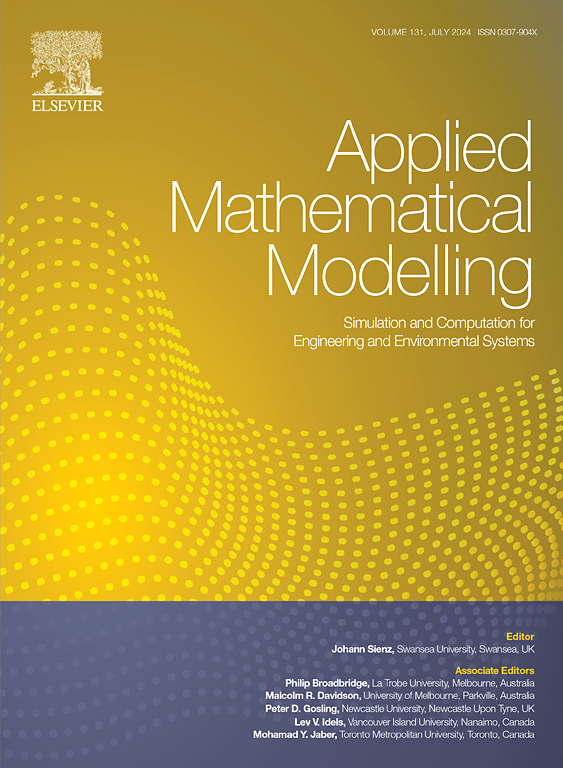Impact of precipitation on the resilience of tropical forests to non-Gaussian Lévy fluctuations
IF 4.4
2区 工程技术
Q1 ENGINEERING, MULTIDISCIPLINARY
引用次数: 0
Abstract
Understanding the resilience of tropical vegetation to perturbations and disturbances is crucial for predicting ecosystem responses to climate change. Here we investigate the stability of tropical forest ecosystems across varying precipitation levels and the influence of extreme events, which are modeled as burst-like pulses following a heavy-tailed distribution, using an α-stable Lévy process. The non-Gaussian index α and noise intensity ε of α-stable Lévy processes characterizes the frequency and the intensity of these extreme events. We propose a novel global resilience measure based on the stationary density to quantify the probability of the system to remain within its basin of attraction despite extreme perturbations. Our findings reveal that higher precipitation levels inherently provide greater stability to the forest state, even in the presence of larger noise intensities and higher frequencies of small jumps in extreme events. In contrast, at a low precipitation level, forest resilience is markedly reduced and declines rapidly with rising noise intensity, indicating a higher susceptibility to perturbations. Our study highlights the critical role of precipitation in modulating the resilience of tropical forests to disturbances, realistically modelled as non-Gaussian Lévy fluctuations.
降水对热带森林对非高斯lsamy波动恢复力的影响
了解热带植被对扰动和干扰的恢复能力对于预测生态系统对气候变化的响应至关重要。在这里,我们研究了热带森林生态系统在不同降水水平下的稳定性和极端事件的影响,这些事件被建模为重尾分布后的突发脉冲,使用α-稳定的lsamvy过程。α稳定lsamvy过程的非高斯指数α和噪声强度ε表征了这些极端事件的频率和强度。我们提出了一种新的基于平稳密度的全球弹性度量,以量化系统在极端扰动下保持在其吸引力盆地内的概率。我们的研究结果表明,更高的降水量本质上为森林状态提供了更大的稳定性,即使在极端事件中存在更大的噪声强度和更高频率的小跳跃。相比之下,在低降水水平,森林恢复力明显降低,并随着噪声强度的增加而迅速下降,表明对扰动的敏感性更高。我们的研究强调了降水在调节热带森林对干扰的恢复力方面的关键作用,实际模拟为非高斯lsamvy波动。
本文章由计算机程序翻译,如有差异,请以英文原文为准。
求助全文
约1分钟内获得全文
求助全文
来源期刊

Applied Mathematical Modelling
数学-工程:综合
CiteScore
9.80
自引率
8.00%
发文量
508
审稿时长
43 days
期刊介绍:
Applied Mathematical Modelling focuses on research related to the mathematical modelling of engineering and environmental processes, manufacturing, and industrial systems. A significant emerging area of research activity involves multiphysics processes, and contributions in this area are particularly encouraged.
This influential publication covers a wide spectrum of subjects including heat transfer, fluid mechanics, CFD, and transport phenomena; solid mechanics and mechanics of metals; electromagnets and MHD; reliability modelling and system optimization; finite volume, finite element, and boundary element procedures; modelling of inventory, industrial, manufacturing and logistics systems for viable decision making; civil engineering systems and structures; mineral and energy resources; relevant software engineering issues associated with CAD and CAE; and materials and metallurgical engineering.
Applied Mathematical Modelling is primarily interested in papers developing increased insights into real-world problems through novel mathematical modelling, novel applications or a combination of these. Papers employing existing numerical techniques must demonstrate sufficient novelty in the solution of practical problems. Papers on fuzzy logic in decision-making or purely financial mathematics are normally not considered. Research on fractional differential equations, bifurcation, and numerical methods needs to include practical examples. Population dynamics must solve realistic scenarios. Papers in the area of logistics and business modelling should demonstrate meaningful managerial insight. Submissions with no real-world application will not be considered.
 求助内容:
求助内容: 应助结果提醒方式:
应助结果提醒方式:


